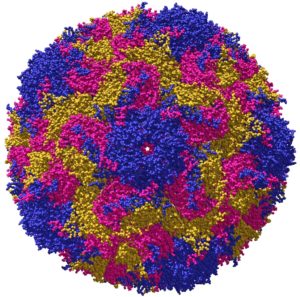
Amy joins the TWiV team to review evidence that enterovirus D68 is an etiologic agent of childhood paralysis, and her finding that the ability of the virus to infect cells of the nervous system is not a recently acquired property.
Hosts: Vincent Racaniello, Dickson Despommier, Rich Condit, and Kathy Spindler
Guest: Amy Rosenfeld
Click arrow to play
Download TWiV 572 (73 MB .mp3, 121 min)
Subscribe (free): iTunes, Google Podcasts, RSS, email
Become a patron of TWiV!
Links for this episode
- EV-D68 antibodies in humans before 2014 outbreak (Emerg Inf Dis) 17:30
- Enterovirus antibodies in CSF of AFM patients (mBio) 22:35
- Serology implicates enteroviruses in AFM (Nat Med) 30:48
- EV-D68 neurotropism is not new (mBio) 49:08
- Letters read on TWiV 572 2:36
- Timestamps by Jolene. Thanks!
Weekly Science Picks 1:39:49
Amy – Enterovirus biology and pathogenesis and Acute Flaccid Myelitis Association
Rich – Tesla
Dickson – Nikon Small World 2019 Photo Competition
Kathy – Term limits in academic leadership #1 and #2
Vincent – Coywolf: New hybrid carnivore
Listener Picks
Anonymous – Spill the Beans vaccinated shirts
Intro music is by Ronald Jenkees.
Send your virology questions and comments to twiv@microbe.tv


Please correct Dickson regarding rodents in Australia. Rodents are actually Australia’s only native placental mammals. They have been on our continent for at least 4 million years, which is obviously less than the ancestors of our current marsupials, but still plenty of time for them to evolve into fill many important ecological niches. Check out this recent news item about one such rodent, the Rakali, beautifully adapted to our river systems and that has developed a technique for making sushi out of the toxic and invasive cane toad
https://www.abc.net.au/news/science/2019-11-01/cane-toad-native-animals-eating/11649498
Interested in the discussion about the blood brain barrier. We are seeing those of us with myalgic encephalomyelitis are at risk of BBB issues. Could that change the IGG answer?